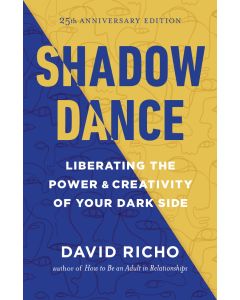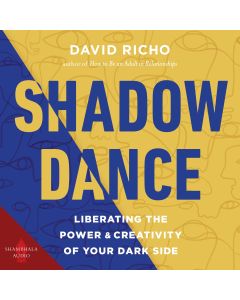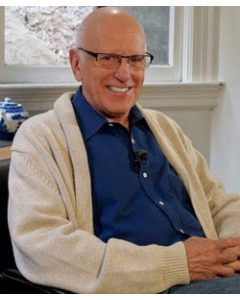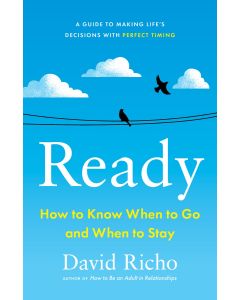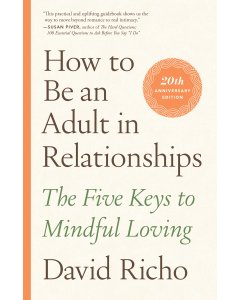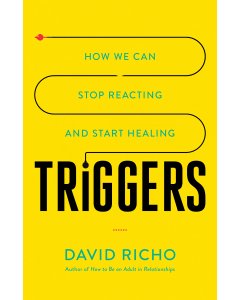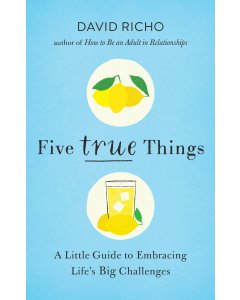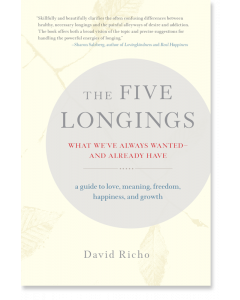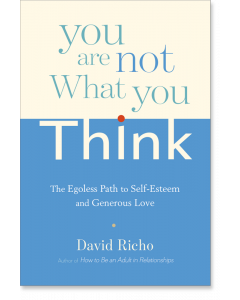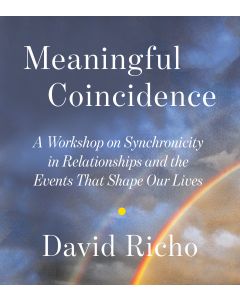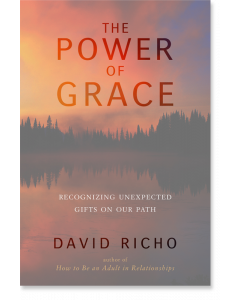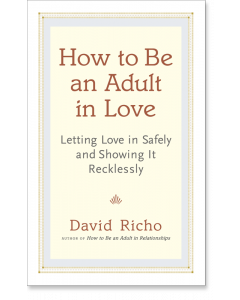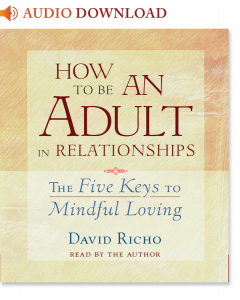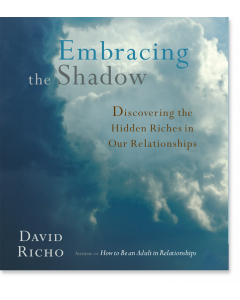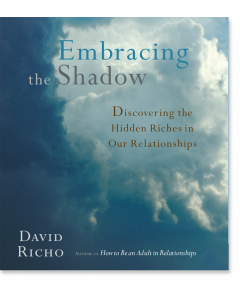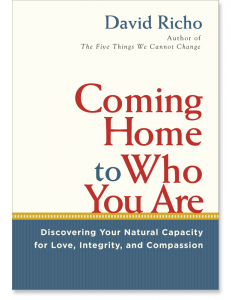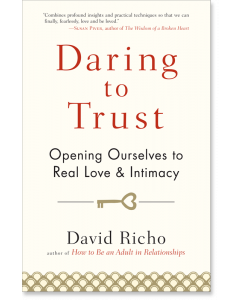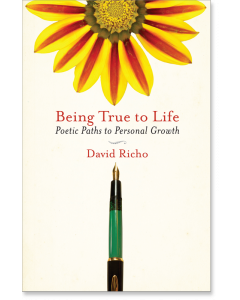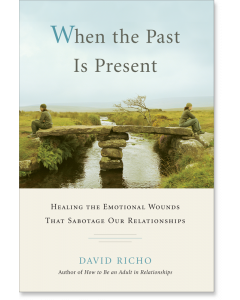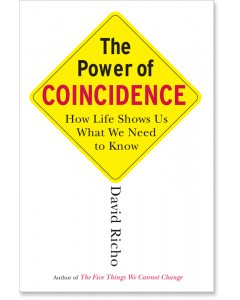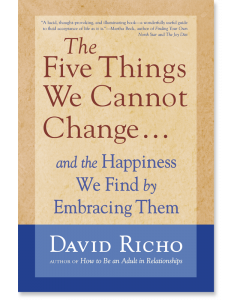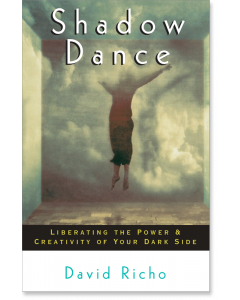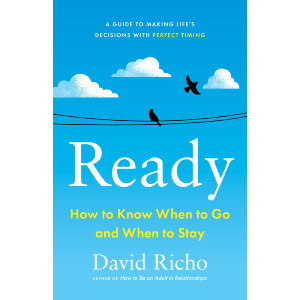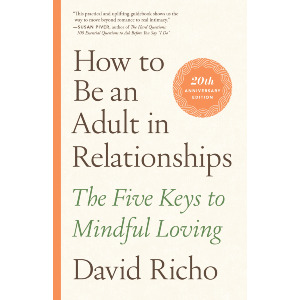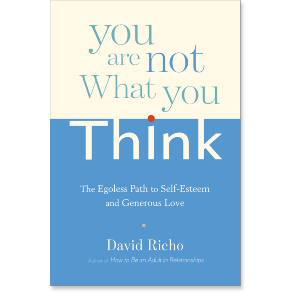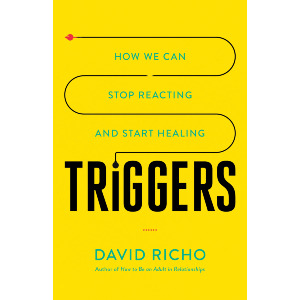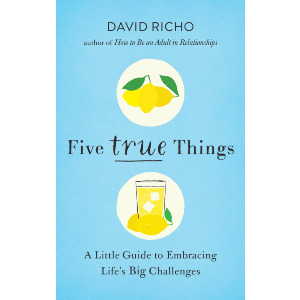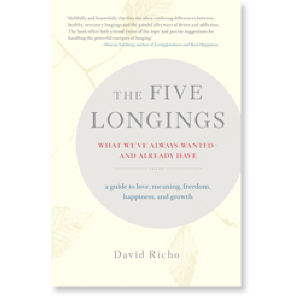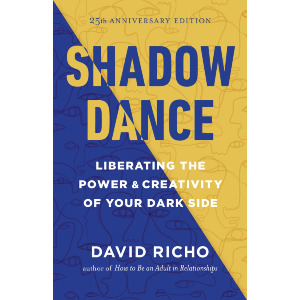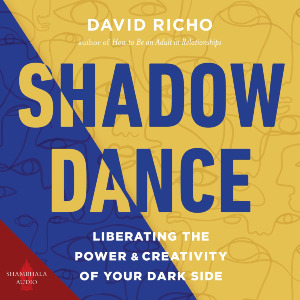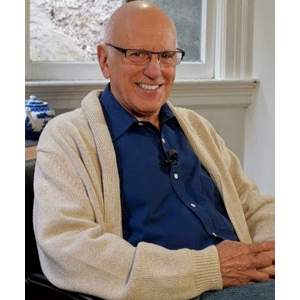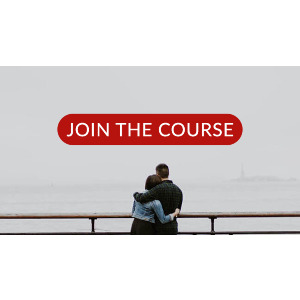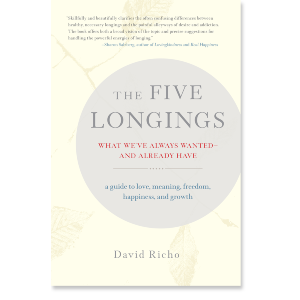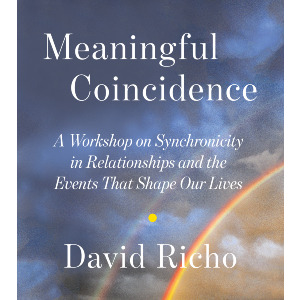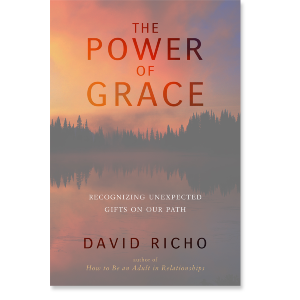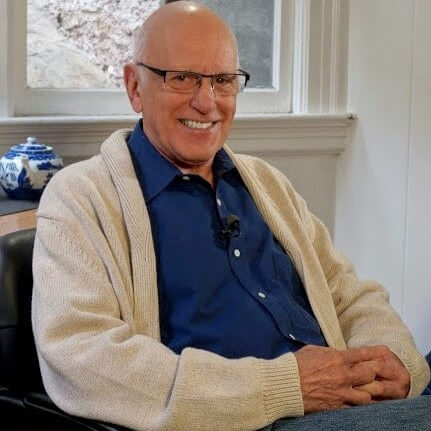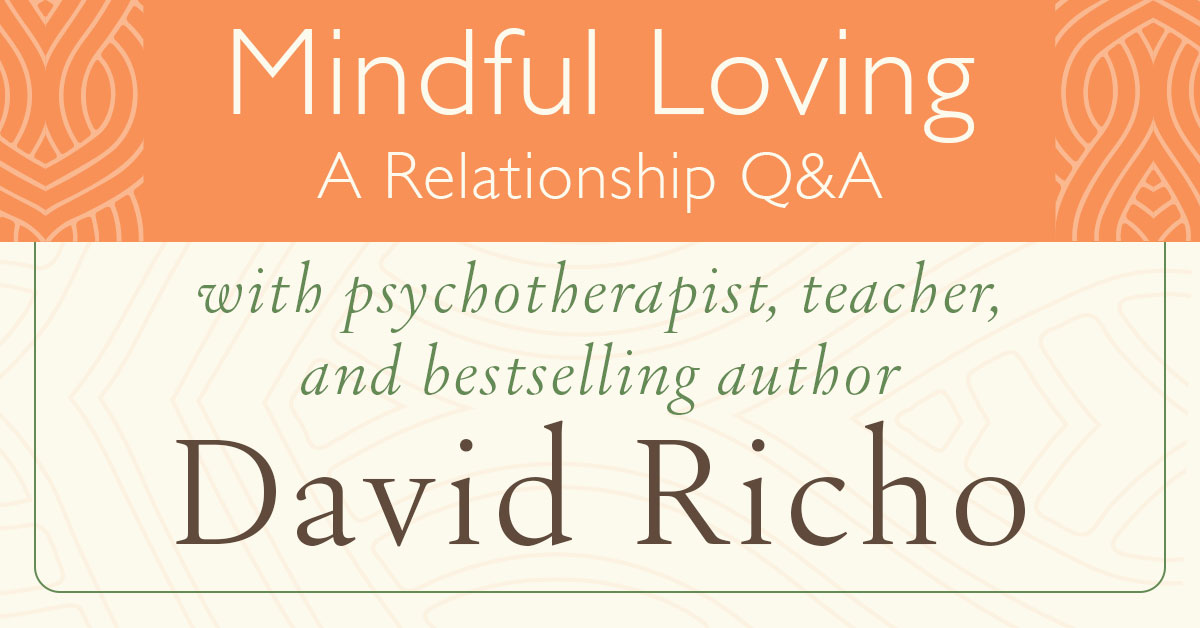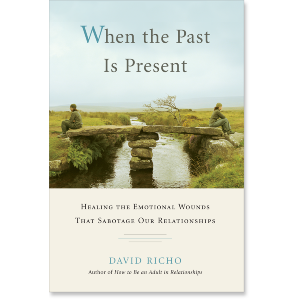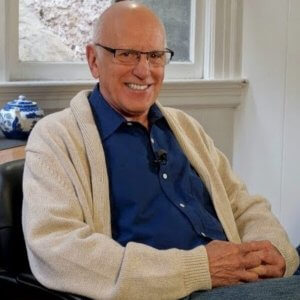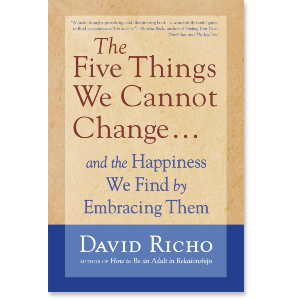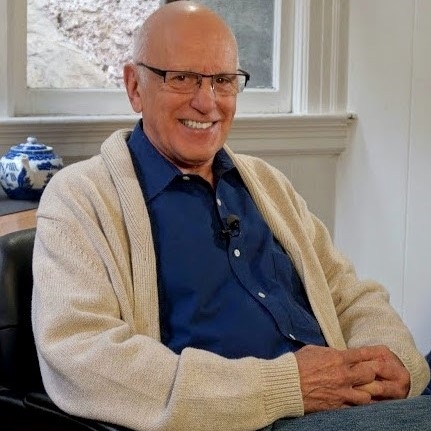

David Richo
David Richo, PhD, is a psychotherapist, teacher, writer, and workshop leader whose work emphasizes the benefits of mindfulness and loving-kindness in personal growth and emotional well-being. He is the author of numerous books, including How to Be an Adult in Relationships and The Five Things We Cannot Change. He lives in Santa Barbara and San Francisco, California.
David Richo
David Richo, PhD, is a psychotherapist, teacher, writer, and workshop leader whose work emphasizes the benefits of mindfulness and loving-kindness in personal growth and emotional well-being. He is the author of numerous books, including How to Be an Adult in Relationships and The Five Things We Cannot Change. He lives in Santa Barbara and San Francisco, California.
GUIDES
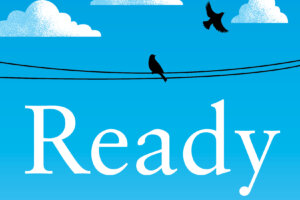

As you left their voice behind
The stars began to burn
Through. . . . —Mary Oliver, “The Journey”
Our inner critic is the part of us that has given up on us. It hurls “can’ts” and “shoulds” at us: You can’t go. You can’t make it alone. You should stay put. The inner critic is a mindset, usually from the past; it’s something we learned, not something we were born with. It is an echo from people and institutions who judged us in the course of life. They include family, peers, religion, school, society. This mindset is now internalized and part of our mental apparatus. Most of us have internalized some shaming messages from our past. The inner critic most often has the voice of the scolding parent. This voice takes on a life of its own in us, so we think we are hearing our own accurate assessment of ourselves. But we are actually listening to a skilled ventriloquist. Yet, there is good news. Since the critic now exists only in our heads, we can change the message we hear. We can input the voice of a nurturing parent or kindly coach instead, one who says what encourages us and bolsters our self-esteem. We can hear in our mind what we wanted to hear from our original parent. We might also hear what our parent or any supportive person in our lives has said. Nurturance can be described as a caring that is shown by the five A’s—sources of joy too!
We can tame or silence the inner critic—this enemy within who tells us we can’t move, can’t make an accurate assessment or a wise choice, that we have no options. We do this not with a whip but with gentle coaxing of the negative voice onto the channel of self-advocacy. Free of self-deception we might say to ourselves: “So much of what I hear from myself is not really me. I allow my supportive voice to have a say.”
One inroad into the posture of the inner critic is noticing that the voice always sounds final: this is who you are and all you are. It is absolute in its verdict: you are nothing but guilty or weak or inadequate. It is not provisional. It is not open to discussion, to solutions, to alternatives—exactly the style that can keep us stuck. Indeed, an inner critic abhors the idea of a journey; it wants only to keep us immobile, unevolving. In other words it is nothing less than the bully of fear. This is why it can’t be right in what it whispers to us. The inner critic is on the side of self-reproach, self-abnegation, self-negation, self-loathing. It does not love us. Likewise, the inner critic moves from one particular experience to a deadly generalization. “She doesn’t like me” becomes “I am unlikable.” Thus, what happened today becomes tomorrow’s decree. The inner critic is the heretic who denies the Buddhist teaching on enlightened liberation being available to everyone all the time.
Six Practices to Change the Inner Critic into an Inner Ally
Here are some ways to reset our inner critical voice into one of self-advocacy. Choose any one or try one each day:
Moving from Past to Present
List three negative messages from your inner critic in your journal. Connect each statement to its origin, usually in early life. Was it appropriate then? Is it appropriate now? What shame did you feel? Where did you first hear this? Who said it? Were they trying to help or hurt you? Do this without blame for anyone but only as an accessing of information.
Moving from Always to Sometimes
Notice if the inner critic’s vocabulary is absolute: You always . . . You can’t ever . . . Under the absolute statement write a more inclusive one. Don’t deny the main point but only reduce it from absolute to relative: “Yes, I often can’t . . .” and “Sometimes I can . . .” Now you are changing a negative verdict against you into a neutral fact about all of us. You are reminding your inner critic—that is, yourself—that inadequacy is a feature of being human. It is a given that all of us sometimes make mistakes, act inappropriately, fail. Let yourself thereby feel a kinship with all other humans. Remind yourself that you also are committing yourself to do what you can to make up for your failings—all that really matters. As Joe Biden said at the 2020 Democratic Convention: “Failure at some point in life is inevitable but giving up is unforgivable.”
Mindfully Breathing
Place the message of the inner critic into a mindfulness container: Sit with the statement and shear it of judgment, shame, belief, insult, triggering. Let it become only words in your head and label them as such. Do all this as you keep coming back to your breaths, lifelong teachers of taking in and letting go.
Showing Self-Compassion
The inner critic disregards the pain it causes us by its put-downs. It does not seem to care about how our feelings are hurt, how our self-esteem is diminished. We can, however, step in and show self-compassion as the antidote to its judgments. We are actually helping our inner critic become compassionate. Our practice also extends to the inner critic in us that judges others, whether internally or vocally. In that area too, we convert judgment into compassion. Everything we judge others for has some kind of pain behind it. Our practice is to look for the pain the other might be feeling in doing what we believe is wrong. For instance, we judge someone as controlling. Behind that behavior there can be the pain of compulsion and fear. We are retraining our brain so that our inner judgments automatically redirect into compassionate avowals.
Giving Equal Time
The inner critic catastrophizes about upcoming events and sees the worst as what will definitely happen. We then worry about the outcome. Worry can be reduced by openness to other possibilities beyond the catastrophic. As a practice, we expand our speculation: We give equal time to the opposite of catastrophe. We acknowledge that the worst might not happen. We hold our hands out palms up and imagine we are holding the negative speculation in one hand and the positive in the other. We look at the hand holding the positive and see ourselves being grateful. We look at the negative one and see ourselves being courageous in handling whatever happens. Now we are allowing our minds to go in two directions, but in both we find something positive.
Calling on Our Spiritual Resources
Call on the spiritual resource that fits for you. Ask for support in your practice:
Bodhisattvas, help me appreciate your wisdom and compassion.
Holy Spirit, I thank you for your gifts, help me appreciate them and put them to use.
May the universe join me in my personal evolution.
Here are three examples of combining the above practice with these spiritual resources:
Inner critic: You make stupid mistakes because you are stupid.
Your sane voice: Like all humans, I sometimes make mistakes. I also make up for them when I can.
Your higher self: I have received the gift of wisdom. May it keep opening in and through me. It is opening right now in this practice I am doing and being.
Inner critic: You will never amount to anything.
Your sane voice: Like all humans, I will sometimes be successful and sometimes not. I commit myself to do all I can to live a worthwhile life.
Your higher self: I am of great value to myself, others, and the world. May I deeply grasp this and be thankful for it.
Inner critic: You have nothing to offer a partner or a career.
Your sane voice: Like all humans, I have some valuable qualities. I will keep gaining knowledge and skills. I have no control over whether someone will see them, but I will keep showing them.
Your higher self: I have all the effulgent virtues and graces that any human may have. I also keep upgrading my skill set to fulfill my calling. May I be thankful and keep sharing my gifts with the world around me.
We don’t have to worry too much about buying into our self-deceptions. Our higher self is unrelenting in its battle against pretense. Circumstances and people will keep appearing on our stage that will unmask the characters and plot. This will feel threatening to the imperious ego robed so safely in its thousand disguises. But a subtheme of this book is letting go of an inflated ego, the harbinger of a great fall, so let’s welcome the opportunity.
This book offers many practices and proposes many changes in how we relate to ourselves, others, and our world. None of us will be perfect or totally successful in establishing new mindsets and behaviors without work on ourselves. In addition, a readiness has to happen that is beyond the reach of work. One of my greatest joys is knowing that I am more and more of a beginner and being friendly toward that position.
My pilgrim’s progress has been to climb down a thousand ladders until I could finally reach out a hand of friendship to the little clod of earth that I am.
—Carl Jung, response to a student who had just read Bunyan’s book and asked Jung what his “pilgrim’s progress” consisted of
Share
An Excerpt from Ready
Related Books
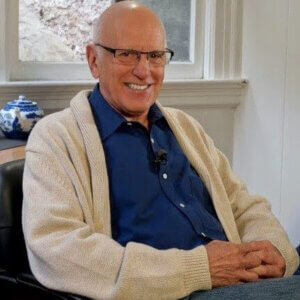
David Richo, PhD, is a psychotherapist, teacher, writer, and workshop leader whose work emphasizes the benefits of mindfulness and loving-kindness in personal growth and emotional well-being. He combines Jungian, poetic, and mythic perspectives in his work with the intention of integrating the psychological and the spiritual.
David Richo is the author of numerous books, including How to Be an Adult in Relationships and The Five Things We Cannot Change. He lives in Santa Barbara and San Francisco, California.
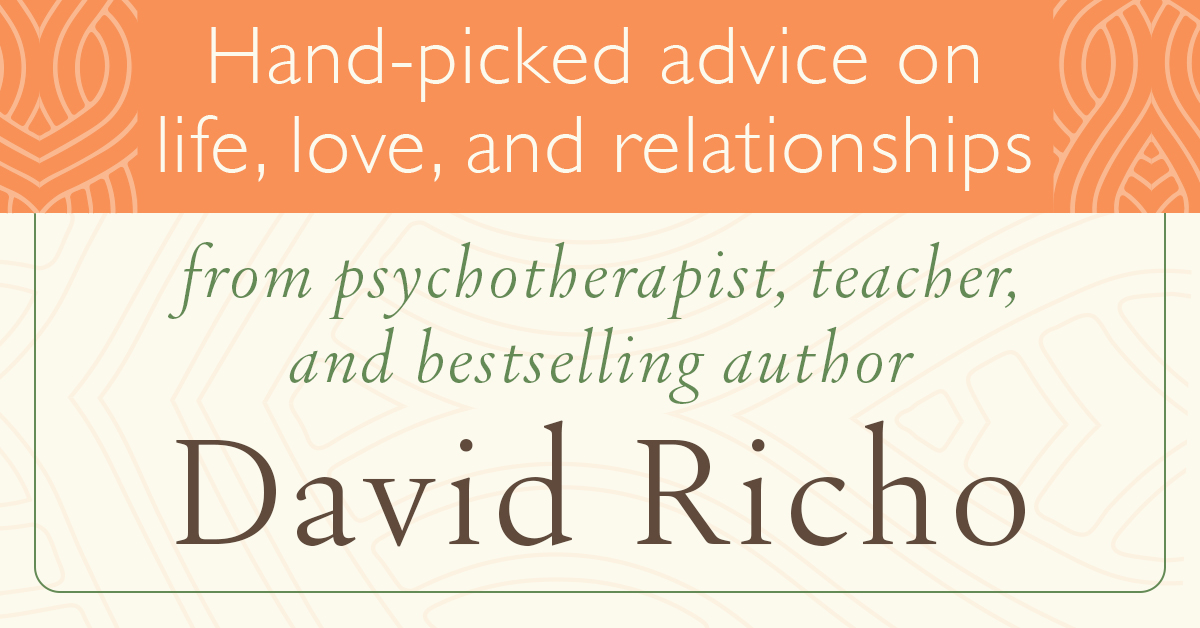
Sign up to receive hand-picked advice on life, love, and relationships from psychotherapist, teacher, and bestselling author David Richo.
With over 50 years of experience as a psychotherapist, David Richo is a leading relationship expert whose work has touched hundreds of thousands of hearts and lives. Blending Western psychology and Eastern spirituality, he offers a fresh and inspiring approach to personal growth and emotional well-being, providing us with the tools we need to care for ourselves and the world around us.
Over the next two months, we'll be sharing a series of hand-picked quotes from each of Richo’s books that explore topics like emotional healing, mindful loving, healthy communication, and personal growth.
We hope these offerings serve as a source of reflection, meditation, and growth for you and your relationships.
David Richo, PhD, is a psychotherapist, teacher, writer, and workshop leader whose work emphasizes the benefits of mindfulness and loving-kindness in personal growth and emotional well-being. He combines Jungian, poetic, and mythic perspectives in his work with the intention of integrating the psychological and the spiritual.
David Richo is the author of numerous books, including How to Be an Adult in Relationships and The Five Things We Cannot Change. He lives in Santa Barbara and San Francisco, California.
Mindful Loving: A Relationship Q&A
Relationships as a Spiritual Practice
A Q&A with David Richo, author of How to Be an Adult in Relationships
What does it mean to be an “adult” in relationships?
Firstly, what does it mean to be an “adult?” To be an adult is to learn to play for ourselves the roles the functional family was supposed to play for us. Becoming more adult means having an inner nurturant parent who supervises our unruly inner child, protects our endangered inner child, and comforts our scared inner child. It is only through the nourishment of our inner child that we can learn to engage in a healthy adult relationship.
To be an adult in relationships we must commit to a thoroughly truthful enterprise of ongoing love. It entails an unremitting willingness to keep agreements and handle obstacles by addressing, processing, and resolving conflicts. Happiness and mutual respect result. True love cannot be fooled, nor does it attempt to fool others. As mature adults, we can no longer be charmed by looks or sweet talk. All that matters is enduring mutual commitment.
Ultimately, to be an adult in relationships means:
- to make and keep commitments
- to act from integrity not only in our intimate relationships but in all our dealings
- to take responsibility for our feelings, behaviors, and choices
- to act in trustworthy ways, including being faithful to the ground-rules of our relationship
- to show the five A’s of love: attention, affection, appreciation, acceptance, allowing
When we apply mindfulness to our relationships, we can finally see ourselves and others as we are, in all our touching vulnerability and with all our rich potential for love.
In How to Be an Adult in Relationships you say, “love is not so much a feeling as a way of being present.” Can you elaborate on this?
Love is not so much a feeling as a way of being present. We show love through a sustained and active presence with an unconditional expression of the five A’s and without the conditioned overlays or mindsets of ego, such as judgment, fear, control, and so on. We receive love the same way—with the five A’s and without our ego interferences. In other words, love happens best in the context of mindfulness.
Mindfulness is an ancient meditation mode in which we let go of our fears, our attachments, our cravings, our expectations and entitlements, and our judgments of others. Instead of these habitual strategies, we learn to simply stay present openly in the moment—with nothing in the way—so we can experience life as it occurs. When we apply mindfulness to our relationships, we can finally see ourselves and others as we are, in all our touching vulnerability and with all our rich potential for love.
Have you seen relationships change over the last few years due to COVID? Do you have any advice during these times?
Yes, I have seen more strain on relationships because the hunkering down means we are required to spend more time together. Healthy relationships thrive on a combination of alone time and together time. When we are forced to be together for too long we begin to lose our patience with one another and anger arises. This means that we lose some of our communication skills. We may even begin to feel smothered or a loss of freedom.
If you feel the pressures of the current pandemic weighing on your relationship, I suggest sharing your concerns with your partner and working together to find a new balance of alone time and together time that works for you. Cooperation—partnership—is the heart of conflict resolution. We are not working individually for the ascendancy of our own positions. We work together for the health and happiness of the relationship.
Take a moment to assess the balance of alone time and together time within your relationship with this exercise:
VOWING/DISAVOWING | Ask yourself: Does my vow of commitment to my partner require a disavowing of any part of myself? Ask these questions of one another: Can we find ways to work separately on the inner discoveries we both need to make before we can fulfill one another’s needs adequately? Can you grant me that space? Can I allow you that space? Can I trust that you will still be there for me when I come back intact and ready to be in touch? Will I be there for you also? Or will our own urgent childhood needs or our desire for drama be so intense that we will vitiate or scuttle this whole soulful venture? Are we genuinely committed to doing the work it will take to safeguard our relationship?
How can we take critical feedback from our partners without getting defensive?
When you are committed to the work of making yourself a more loving person, you no longer rely on your own brain for all your information. You are happy to learn about yourself from your partner or anyone else you trust. You are open to finding out how you appear to those who see your shadow or dark side. You welcome feedback about how you come across to others. If you find that your ego cannot tolerate being called to task or shown to be inadequate or wrong, then the work is letting go of ego. A good affirmation is: I commit myself to find some truth in any feedback I receive.
Why do we seek to re-enact the deficits, wounds, and deprivations of our childhood with our current partners?
A poignant thing about us humans is that we seem hard-wired to replay the past, especially when our past includes emotional pain or disappointment. Though most of us want to move on from the past, we tend to go through our lives simply casting new people in the roles of key characters, such as our parents or any significant person with whom we still have unfinished emotional business. Unbeknownst to us, we are glimpsing important figures from our past in our partners, friends, associates, enemies, and even strangers. We bring them the still unfinished or unseen or unexpressed feelings and needs of childhood. Recreating relationship patterns from our childhood is our way to tell the untold story inside us and complete it.
For better or for worse, our psychic development is the result of a lifelong continuum of relationships. The adult goal is to work through each of them.
When we did not receive fulfillment in one or more of the five A’s, a bottomless pit was created in us, an unfulfillable yearning for the missing pieces of our puzzling and arid past. Mourning an unfulfilled childhood is painful. We fear grief because we know we will not be able to control its intensity, its duration, or its range, and so we look for ways around it. But engaging with our grief is a form of self-nurturance and liberation from neediness. Paradoxically, to let ourselves experience our wounded feelings fully places us on the path to healthy intimacy.
Ask yourself:
Is this my problem? Have I been afraid to grieve what I did not get from Mom and Dad and so have demanded it from partners, strangers, and innocent bystanders? Am I unable to find it in myself because I have been investing all my energy in looking for it in someone else?
This topic became another book of mine. The title says it all: When the Past Is Present: Healing the Emotional Wounds That Sabotage Our Relationships.
Our work is not to renounce our childhood needs but to take them into account, work on them, and enlist our partner to help us do this, if she or he is willing.
Why is it important to be a ‘mirror’ for your partner?
Mirroring helps us survive emotionally—that is, to experience the events of our life with the power to handle them and without being devastated or embittered by them. We all have what it takes to feel, but to experience our feelings fully and safely, they have to be “validated” by someone who mirrors them. Mirroring happens when someone accurately reflects our feelings back to us with a warm welcome. We then know we are understood and it is safe to have and show our feelings. Mirroring by someone includes unconditional positive regard for our unique needs, values, and wishes shown by someone who mindfully provides the five A’s. The element of mindfulness means that we feel loved without the ego’s artifacts of fear, attachment, control, expectation, clinging, biases, defenses, or judgment.
This practice from my book is designed to strengthen your understanding of mirroring:
MIRRORING | In every phase of life we see the influence of our earliest longings. Our work is not to renounce our childhood needs but to take them into account, work on them, and enlist our partner to help us do this, if she or he is willing. Our goal is not just to cut our parental ties but to unite with a partner who can join us in our work. As Shakespeare says in King Lear, “Who alone suffers, suffers most.”
Ask these questions of your partner: I was derailed in some of my development. Can you help me in my efforts to get back on track? Are you the person with whom I can safely welcome and revive my earliest unmet needs and redirect my thwarted strivings? Can I work with you on mutual mirroring, that is, understanding and welcoming of feelings? Do I sometimes trigger you into feeling something I couldn’t bear to feel, so that you can help me identify it and then hold it with me? Do you make me feel the things you couldn’t bear to feel? How can we challenge ourselves on all this and move past it? Which of my feelings do you mirror? Which of yours do I mirror? Which feelings do we fear in one another?
How do we know when it’s time to move on from a relationship?
Last year was my fiftieth anniversary as a psychotherapist, and I asked myself what problem I saw the most in clients. The answer was: staying too long in what doesn’t work. That has been true of me too. You?
We have all stayed too long in what doesn’t work. The “what doesn’t work” can apply to relationships, jobs, addictions, chronic pain, unresolved conflicts, enmeshment in family drama, affiliation to a religion, organization, or institution—just about anything we become involved in.
On the other hand, there are times in life when we don’t stay long enough. We don’t hang in there through thick and thin in a relationship or affiliation that really can work. There is also the mystery of timing, feeling and responding to the opportune time. Ultimately, our readiness depends on the ping of a timer not in our hands. Time is a player in all our comings and goings.
My book, Ready: How to Know When to Go and When to Stay, coming out this April, treats this topic and presents practices that can help us know our timing and act in accord with it.
Share
Related Books
David Richo, PhD, is a psychotherapist, teacher, writer, and workshop leader whose work emphasizes the benefits of mindfulness and loving-kindness in personal growth and emotional well-being. He combines Jungian, poetic, and mythic perspectives in his work with the intention of integrating the psychological and the spiritual.
David Richo is the author of numerous books, including How to Be an Adult in Relationships and The Five Things We Cannot Change. He lives in Santa Barbara and San Francisco, California.
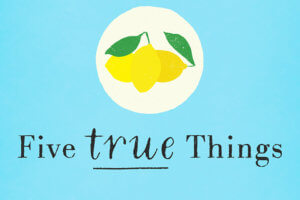
Things Do Not Always Go According to Plan
The Unruly Givens of Life
Excerpt from Five True Things
For all that has been: Thanks!
For all that shall be: Yes!
—Dag Hammarskjöld, Markings
In the early 1940s, on the night of her graduation party, a high school girl named Doris Van Kappelhoff was involved in a serious car accident. She had planned to go to Hollywood to become a dancer in films, but her injuries made that future no longer possible. Doris, during her long homebound recuperation, began to sing along with the female vocalists on the radio. Her voice became so well trained that she was hired to sing in a band, and soon thereafter, she found parts in movies, changing her name to Doris Day. Her original plans were dashed by a tragic event, but thereby she found her true calling. Things don’t always go according to our plans, but a change of plans may be an example of synchronicity, the mysterious set of coincidental circumstances that lead us to a life fulfillment unguessed and unsought—other words for grace.
We make plans expecting to be in control of what will happen. Perhaps we fear natural happenings, things turning out contrary to our wishes. We are challenged by life’s “mind of its own” to let go of having things come out our way. This is about control. We may act with precision, and self-discipline, expecting the world to follow suit and grant us our reward.
Perfect discipline, or perfect control, is the best way to miss out on the joy of life. The unruly givens of life are permissions not to be perfect. We can flow into the natural chaos of life—so untidy, so unpredictable—or we can try to order life fully by making careful plans. But as Robert Burns says to a mouse: “The best-laid schemes of mice and men oft go astray and leave us naught but grief and pain for promised joy.” We know now that a yes to life is a yes to grief and pain, since all the conditions of existence represent losses and disappointments. Yes is a healthy response to the human condition.
To grow into adulthood means that we accept the givens of life as they are, and this helps us accept ourselves as we are.
Making plans is an adult occupation, a feature of the healthy ego. In fact, though, life often does not proceed according to our plans. This does not have to leave us crestfallen. It can make us excited that something spiritual—that is, unconjured by ego—may be afoot. Perhaps we believe the universe has a plan that more accurately reflects our emerging destiny. Perhaps we believe there is no plan at all and “them’s the breaks.” As adults we do not console ourselves with promises of a silver lining on every cloud or a Shangri-la in any land. Our comfort is in our commitment to deal with what happens and make the best of it. Or are we angry that the givens make us keep having to grow up?
To grow into adulthood means that we accept the givens of life as they are, and this helps us accept ourselves as we are. Being an adult means living with life’s conditions in an allowing way.
Maybe we don’t fit psychology’s definition of “well-adjusted,” or maybe we didn’t benefit from healthy emotional development. We did not have a perfect childhood or a perfect adolescence, and we are not having a perfect adulthood. All our investments are not paying off. All our hopes for the future are not coming true. Life is unpredictable and not at our beck and call. Can that become palatable? Can that be appreciated as somehow useful to our becoming people of character, depth, and compassion? Then to complain is to have missed the point.
In a world in which I may not do or finish anything perfectly or get anything permanently right, it makes sense to let go of the need for perfection. The Bhagavad Gita says: “Even a little progress is complete freedom from fear.” Can I be satisfied with that as my style? As long as I am doing my best most of the time and can let things happen as they happen and then do the best I can with them, I am perfectly human, and that is a supreme achievement. The alternative is hubris: “I can always get it right; I am better than other people.” Enlightenment is ordinariness loved, amor fati. It is saying: “I let go of more than any fate can take.”
Error and errancy are not tragedies. They are ingredients of and directions to discovery. They show us paths that humble us, startle us, and point us to new horizons. They do not have to lead to regret or shame. We say yes to our imperfection and accept our mistakes. We learn not to do it that way next time. Mistakes are not a sign of stupidity. They are human ways of learning. Recalling our big mistakes in life is a way of staying humble, the virtuous flower that blooms from the bud of yes. Humility leads us to commit ourselves to admitting our mistakes and making amends for anything we have done that may have hurt others. Such humility is a bridge to the letting go of regret.
We exist because of a beatific vision: the divine is focusing into time and space, and we are focusing back.
Things are not always as we would like them to be, nor do plans always work out our way. The fact that we are not in control means that the proper bearing for life on the raft of this floating world is surrender to what is as it is, how it is, when or where it is. We can fight with all our might for what can be changed, but only surrender works with what cannot be changed. The fact that we are not in control and that things happen that we neither sought nor planned means that there are forces at work bigger than our egos. This given is thus an intimation of divinity, as Ralph Waldo Emerson says: “So nigh is grandeur to our dust.”
What is the divine? It may be Something—we know not what or whom, we know not how or when—that is always at work, but we do know why: so we can fulfill our destiny to become unique exemplars of love and wisdom. The divine is the life force of the living universe that yearns to articulate itself in all of us. The finite is a unique moment of focus on the timeless infinite. We exist because of a beatific vision: the divine is focusing into time and space, and we are focusing back. When the divine arrives here, it is I, and when it reaches there, it is you, and when it lands outside my window, it is that fig tree under which Buddha was enlightened, sitting quietly in an attitude of yes for a long time.
Evolutionary Conditions
The conditions of existence are our open sesames to evolution. Nature—and we—join to say yes unconditionally to an expanded version of the five givens. Here is a list that shows what the givens of our lives look like when they happen in and to nature. Evolution is nature’s plan, but it is not quite knowable. There is an order and balance in our universe that coexists with a formidable unpredictability beyond human control.
In the givens that follow ask yourself how each of them applies to your present way of living your life:
- Everything changes and passes from one form to another.
- Matter, like spirit, is neither created nor destroyed but evolves in transformational seasons of beginning, growing, cresting, harvesting, dying, and renewing.
- The universe, like the human soul, is both finite and infinite.
- There is no single reliable configuration of how things are or how they are supposed to be or how they will turn out. Instead, there is infinite and unending possibility, just what animates our own souls.
- Events do not always line up in accord with the human version of order.
- Nothing and no one is truly separate; all is intricately and necessarily interconnected.
- Everything is zealously engaged in becoming what it is. Everything is becoming what it is meant to become no matter what the interferences or odds.
- Nothing is ever complete or finished. Everything is a work in progress, especially ourself.
- All beings in nature are subject to time by reason of birth and death.
- We are all continually evolving—taking on the new and letting go of the old—to fit the changing conditions of the environment. We evolve because of changes such as birth and death.
- The past of things and people strongly influences their present condition, yet it does not have to determine their future.
- Love, wisdom, and healing endure as driving forces both in our human stories and in the story of the universe. Simultaneously, nature is driven by destructive forces that are necessary for the survival of us all.
- When we intuit a truth of the universe, we feel a bodily resonance: it “feels right.” We are clicking into the archetypal code of our humanity, and it matches the evolutionary code of the universe.
- The center of both the universe and the psyche is a single movable feast, and the circumference is nowhere to be found.
Would but some wingéd Angel ere too late
Arrest the yet unfolded Roll of Fate,
And make the stern Recorder otherwise
Enregister, or quite obliterate!
Ah, Love! could you and I with Him conspire
To grasp this sorry Scheme of Things entire,
Would not we shatter it to bits—and then
Re-mould it nearer to the Heart’s Desire!
—The Rubáiyát of Omar Khayyám
(translated by Edward FitzGerald)
It All Balances in Love
Our personal plans work best when they align with a larger plan. This happens when we live not only for ourselves and our loved ones but for the world as well. Loving-kindness fosters this responsiveness to a universal caring. We extend our concern beyond our immediate circle to a universe without circumference. Nature does this too, in that it tailors each species to support others. Shakespeare reminds us in The Merchant of Venice that “such harmony is in immortal souls,” and loving-kindness is a purposeful expression of it.
The balance of nature is not always harmonious, however. It includes room for occasional confusion and disorder. We notice that same chaos in our own lives, no matter how devoted we are to spiritual practices and how earnestly we do our psychological work. Yet there is something in us too, something that is never spent and that irrepressibly survives the tumult of life. This something is the energy that contains us and the universe. This life force, the most reassuring given, is something that endures in us, through us, and beyond us, undamaged and integral, no matter what may have happened to us in the course of our lives.
To grow into adulthood means that we accept the givens of life as they are, and this helps us accept ourselves as we are.
We make the effort to engage in spiritual practices, and then shifts follow that take us beyond the limitations of our ego. These shifts are supplemental graces, personified by the assisting forces in the hero stories. In most tales, the hero or heroine performs his or her task only with the aid of kindly forces, as, for example, Dorothy was helped by the scarecrow, the tin man, and the lion. This is another example of how interconnectedness is such a necessary ingredient for human growth. Assisting forces turn the scared ego into a champion of love, the ignorant ego into a mentor of wisdom, the broken ego into a miracle worker. Nature then holds the ego tenderly, and the ego relaxes and lets itself be held. That is the felt meaning and promise of a balance of person and world, of ego and archetype, of human and divine energies. The ego always wanted to be held like this, no matter how fierce its kicking and screaming.
There are balances we cannot effect or even imagine but that happen when love takes us one step beyond fear. The reason love casts out fear is that love creates the feeling of safety. When we act with love, we feel so good about ourselves that courage blooms. We find the poise to be at home with givens that scared us before. They bless us with the gifts of the unconditioned universal Self: believing in our powers and being comfortable with them, letting go of control, practicing loving-kindness, surrendering to this startling moment, daring defiantly to break through the gates that say “Keep out” or “Don’t go beyond this point.”
May I trust the forces that help me know who I am and where I am going, and may all those who doubt themselves and disregard their destiny likewise be surrounded by inescapable evidence of their limitless identity and destiny.
Share
Related Books
David Richo, PhD, is a psychotherapist, teacher, writer, and workshop leader whose work emphasizes the benefits of mindfulness and loving-kindness in personal growth and emotional well-being. He is the author of numerous books, including How to Be an Adult in Relationships and The Five Things We Cannot Change. He lives in Santa Barbara and San Francisco, California. Learn more.

